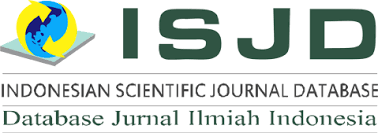CALL FOR PAPERS: VOLUME 1 ISSUE 2 EDITION AUGUST 2021
CALL FOR PAPERS: VOLUME 1 ISSUE 2 EDITION AUGUST 2021
Journal of Contemporary Sociological Issues (CSI)
All Submissions is Free of Publication Fee
Writes can submit the manuscript in Bahasa or English.
The accepted article will be translated and proofread by native speakers.
Submit before July 31st, 2021
Focus and Scope
https://jurnal.unej.ac.id/index.php/JCSI/about/editorialPolicies#focusAndScope
Editorial Team
https://jurnal.unej.ac.id/index.php/JCSI/about/editorialTeam
More information and manuscripts submission at:
🌐 Registration
https://jurnal.unej.ac.id/index.php/JCSI/user/register
📞 Contact
Email: csi@unej.ac.id
Editor in Chief
Dien Vidia Rosa, S.Sos., M.A.
https://wa.me/6285233148871
Support Contact
Hery Prasetyo, S.Sos., M.Sosio.
https://wa.me/6285232700782
Journal of Contemporary Sociological Issues (CSI)
Journal of Contemporary Sociological Issues (CSI) is an open-access journal that does not charge fees for authors or institutional subscriptions. CSI is managed by Advanced Studies on Socio-Economic Development (A-SEED) in collaboration with Center of Human Rights, Multiculturalism and Migration (CHRM2) based at the University of Jember and Asosiasi Program Studi Sosiologi Indonesia (APSSI). The journal provides a platform for sociological issues from various perspectives that welcome empirical, interdisciplinary, and critical approaches to exploring the historical and recent situation of social transformation in the contemporary world.
New editions of the journal are published every February and August. All articles published by CSI are made available online in an open access format and can be downloaded free of charge by all interested parties and individuals.
CSI is primarily focused on issues related to:
✅ Economic and sustainable development
✅ Media and communication
✅ Youth and marginal communities
✅ Feminism and woman rights
✅ Post colonialism and social movements
✅ Social transformation
✅ Political rights
✅ Religious practices
✅ Health care systems
✅ Minority rights and identity
✅ Peasantry and land rights
✅ Tradition and indigenous rights
✅ Social changes, demographic and labor
✅ Alternative educational systems
✅ Tourism and heritage
✅ Demography and working-class
✅ Bureaucracy and good governance
✅ Conflict, and Peace
✅ Environmental and conservation
✅ Various additional cultural articulations issues in the local or global context.













